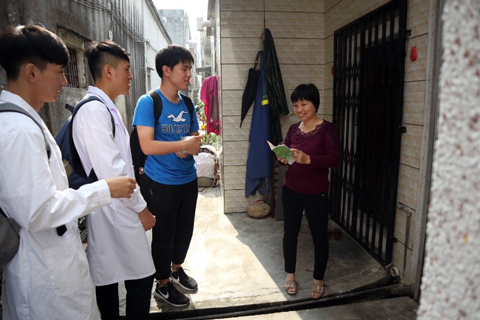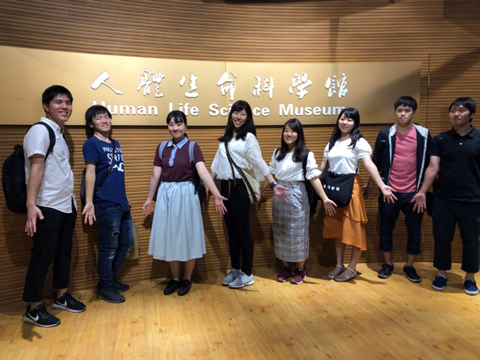International and Domestic exchange
Kenta Yasui (2nd year student)
After completing my study abroad at Shantou University in China
I applied for this study abroad program because I wanted to go to China, see for myself, hear the real voices, and broaden my horizons to see the differences between medical care in China and Japan. This was my first time studying abroad at School of Medicine overseas as a medical student, and I hope to be able to convey at least some of what I experienced and felt there. During this program, I was able to visit various medical institutions and see the general framework of Chinese medical care, and I would like to write about the four things that made the biggest impression on me.
The first was medical volunteer work in a rural area. It is about an hour and a half drive from the center of Shantou City, and there are a certain number of people who live there because of their low income and cannot go to the hospital. Here, I accompanied a medical student from Shantou University and informed the villagers that a free medical examination was being conducted at a place like a village hall, encouraging them to visit. One of the students who accompanied me was from the area, and it was impressive that he communicated using the local language (a kind of dialect), and the villagers who spoke to him seemed relaxed and listened to him. I also learned from the student how to say "We are providing free medical examinations, so please come by" in the local language, and tried to talk to the villagers. At first, my pronunciation was poor and my intonation was wrong, so the villagers were often wary, but when I got my point across, I was able to talk about where I was from and what Japan was like. I felt that this experience could be used in Japan as well, such as using the local dialect to facilitate communication with patients.
The second was the Cleft Lip and Palate Treatment Center. This center treats cleft lip and palate free of charge, and many children were admitted there. Cleft lip surgery is performed at about 6 months of age, and cleft palate surgery is performed at about 1 to 2.5 years of age, when the child begins to learn to speak. After that, speech therapy is used to recover the child's ability to speak normally. Recently, cleft lip and palate have become more widely recognized in China, and the number of patients from rural areas has increased. However, a dozen years ago, children with cleft lip and palate were often brought to the center by monks from temples. This was because parents often left their children at temples because they did not know about cleft lip and palate. Hearing this story made me think again about what a doctor can do to prevent patients without correct knowledge from making the wrong decision. First of all, it is important to convey correct knowledge, but I also felt that it is important to give appropriate advice while taking into consideration the social position of the patient and their family. The third was a tour of School of Medicine campus of Shantou University. First of all, I was overwhelmed by the size of the campus. Each building is large in scale and well-equipped, providing an excellent environment for studying medicine. Of these, the library and medical training facilities were particularly impressive. The library is so elaborately designed that it is said to be the most beautiful in Asia, with an exterior that is reminiscent of an art museum. In the self-study area, many students were studying silently even when there were no tests in progress, which made me keenly aware of the diligence of Chinese medical students. At the medical training facility, each department is equipped with equipment for training various clinical techniques, and there was also much equipment that used VR to simulate surgeries.
The fourth thing I would like to write about is something that impressed me during my study abroad. I visited Shanghai once 10 years ago, and I had a negative impression of China, that it was crowded, cluttered, and had dirty air. However, that negative impression was quickly dispelled. That is, the air is clean. Shantou has a warm climate throughout the year and does not need heating, so the air is relatively clean. In large cities in northern China such as Beijing and Shanghai, the air is polluted in the winter because the areas around the large cities burn coal to keep warm. In addition, industry is thriving, so air pollution is further worsening, and it has become one of the serious environmental problems. In Shantou, there are many dishes that make use of the flavor of the ingredients, which is the opposite of Chinese cuisine that many Japanese people imagine, which uses spices and chili peppers abundantly. Shantou faces the sea in particular, so there is an abundance of seafood. I think it is easy for Japanese people to enjoy. I felt that the Chinese national character was reflected in the transportation. There are rules, but not really any rules, like riding one motorcycle with five people or honking the horn immediately if there is a slow car in front of you. There are so many cars and motorcycles that if you give way to each other, you will never reach your destination, so it seems inevitable.
Through this study abroad, my image of China has completely changed. Everything I saw and experienced there was fresh, and I was surprised at how many of the people I met truly loved Japan. I think the things I saw and heard there, and the memories I made with the people I met there, will be treasured for the rest of my life. Finally, I would like to express my sincere gratitude to the professors at Hyogo Medical University of Medicine who planned this wonderful study abroad program, to Mr. Torii from the International Exchange Center who gave me various advice before I left despite his busy schedule, and to the people at Shantou University who looked after me there.

